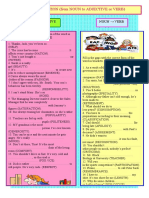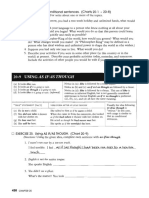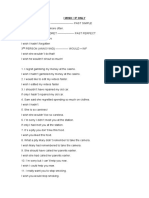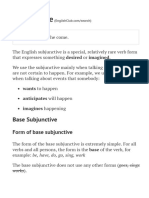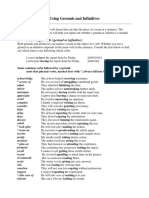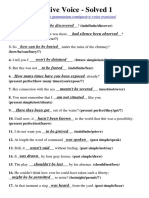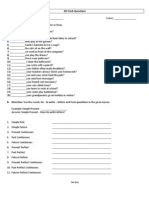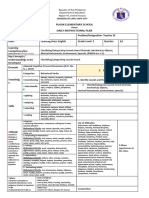0 ratings0% found this document useful (0 votes)
372 viewsMixed Conditionals
The document discusses mixed conditionals, which involve using different verb tenses in the if-clause and main clause of a conditional sentence. There are four main patterns of mixed conditionals: past-present, past-future, present-past, and present-future. Examples are provided for each pattern, showing how the tenses indicate that the condition was or was not met in the past, present, or future. Mixed conditionals allow speakers to express conditional meanings across time periods in nuanced ways.
Uploaded by
andy_fojasCopyright
© © All Rights Reserved
Available Formats
Download as DOCX, PDF, TXT or read online on Scribd
0 ratings0% found this document useful (0 votes)
372 viewsMixed Conditionals
The document discusses mixed conditionals, which involve using different verb tenses in the if-clause and main clause of a conditional sentence. There are four main patterns of mixed conditionals: past-present, past-future, present-past, and present-future. Examples are provided for each pattern, showing how the tenses indicate that the condition was or was not met in the past, present, or future. Mixed conditionals allow speakers to express conditional meanings across time periods in nuanced ways.
Uploaded by
andy_fojasCopyright
© © All Rights Reserved
Available Formats
Download as DOCX, PDF, TXT or read online on Scribd
You are on page 1/ 5
MIXED CONDITIONALS
i) Third Second Mixed Conditionals
If + Past Perfect, + Would + Base Form
1/ For imaginary present actions or situations that are not possible because the necessary conditions
were not met in the past. eg: If you had taken the course, you would know about it. (The conditions
were not met because the person did not do the course and as a result does not know about it now.)
ii) Second Third Mixed Conditionals
If + Past Simple, + Would have + Past Participle
1/ To avoid the illogicality of saying 'If I had been you', which means that I was not you on that occasion,
but could be in the future, which is, of course, impossible.
eg:If I were you, I wouldn't have done that.
2/ Where the first part is still true:
eg:If I could speak Spanish, I wouldn't have needed to get the letter translated.
This means that I couldn't speak Spanish then when I needed the translator and still can't.
Read more at http://www.usingenglish.com/glossary/mixed-
conditionals.html#O1C8yzOCCvxsto6j.99
Conditionals 2
Third conditionals and mixed conditionals
Conditionals are sentences with two clauses an if clause and a main clause that are closely related.
Conditional sentences are often divided into different types.
Third conditional
Third conditional sentences describe the past. They describe something that didnt happen.
If Id studied harder at school I would have gone to university.
He didnt study very hard and he didnt go to university.
We wouldnt have got lost if you hadnt given me the wrong directions.
She wasn't given the correct directions and she didn't find her way.
She might have finished the exam if shed had more time.
She didn't finish the exam and she didn't have more time.
In third conditional sentences, the structure is usually if + past perfect and would + perfect infinitive
(e.g. have done). Its not important which clause comes first.
Notice that other modal verbs can be used instead of would (e.g. could, might may)
Mixed conditionals
In mixed conditional sentences the time in the if clause is not the same as the time in the main clause.
There can be various combinations.
If hed gone to university he might have a better job.
He didnt go to university (past)
He doesnt have a very good job. (present)
This sentence shows the present consequences of a past action.
If Id won the competition Id be going to Florida next week.
She didnt win the competition (past)
She isnt going to Florida (future)
This sentence shows the future consequences of a past action.
If he didnt have to work tomorrow he wouldnt be so miserable today.
He has to work tomorrow (future)
Hes miserable. (present)
This sentence shows the present consequence of a future event.
Those of you who have been following the Conditional Tutorial should now be familiar
with present, past and future conditional verb forms. Sometimes Unreal Conditional
sentences are mixed. This means that the time in the if-clause is not the same as the
time in the result. Study the examples below to learn how to mix conditional verb forms
like a native speaker.
Verbs in green are in the Present Unreal Conditional.
Verbs in red are in the Past Unreal Conditional.
Verbs in purple are in the Future Unreal Conditional.
Mixed Conditional Patterns
PAST PRESENT
Examples:
If I had won the lottery, I would be rich.
BUT I DIDN'T WIN THE LOTTERY IN THE PAST AND I AM NOT RICH NOW.
If I had taken French in high school, I would have more job opportunities.
BUT I DIDN'T TAKE FRENCH IN HIGH SCHOOL AND I DON'T HAVE MANY JOB OPPORTUNITIES.
If she had been born in the United States, she wouldn't need a visa to work
here.
BUT SHE WASN'T BORN IN THE UNITED STATES AND SHE DOES NEED A VISA NOW TO WORK HERE.
PAST FUTURE
Examples:
If she had signed up for the ski trip last week, she would be joining us
tomorrow.
BUT SHE DIDN'T SIGN UP FOR THE SKI TRIP LAST WEEK AND SHE ISN'T GOING TO JOIN US
TOMORROW.
If Mark had gotten the job instead of Joe, he would be moving to Shanghai.
BUT MARK DIDN'T GET THE JOB AND MARK IS NOT GOING TO MOVE TO SHANGHAI.
If Darren hadn't wasted his Christmas bonus gambling in Las Vegas, he would
go to Mexico with us next month.
BUT DARREN WASTED HIS CHRISTMAS BONUS GAMBLING IN LAS VEGAS AND HE WON'T GO TO
MEXICO WITH US NEXT MONTH.
PRESENT PAST
Examples:
If I were rich, I would have bought that Ferrari we saw yesterday.
BUT I AM NOT CURRENTLY RICH AND THAT IS WHY I DIDN'T BUY THE FERRARI YESTERDAY.
If Sam spoke Russian, he would have translated the letter for you.
BUT SAM DOESN'T SPEAK RUSSIAN AND THAT IS WHY HE DIDN'T TRANSLATE THE LETTER.
If I didn't have to work so much, I would have gone to the party last night.
BUT I HAVE TO WORK A LOT AND THAT IS WHY I DIDN'T GO TO THE PARTY LAST NIGHT.
PRESENT FUTURE
Examples:
If I didn't have so much vacation time, I wouldn't go with you on the cruise to
Alaska next week.
BUT I DO HAVE A LOT OF VACATION TIME AND I WILL GO ON THE TRIP NEXT WEEK.
If Cindy were more creative, the company would send her to New York to work
on the new advertising campaign.
BUT CINDY IS NOT CREATIVE AND THE COMPANY WON'T SEND HER TO NEW YORK TO WORK ON
THE NEW CAMPAIGN.
If Dan weren't so nice, he wouldn't be tutoring you in math tonight.
BUT DAN IS NICE AND HE IS GOING TO TUTOR YOU TONIGHT.
FUTURE PAST
Examples:
If I weren't going on my business trip next week, I would have accepted that
new assignment at work.
BUT I AM GOING TO GO ON A BUSINESS TRIP NEXT WEEK, AND THAT IS WHY I DIDN'T ACCEPT THAT
NEW ASSIGNMENT AT WORK.
If my parents weren't coming this weekend, I would have planned a nice trip
just for the two of us to Napa Valley.
BUT MY PARENTS ARE GOING TO COME THIS WEEKEND, AND THAT IS WHY I DIDN'T PLAN A TRIP
FOR THE TWO OF US TO NAPA VALLEY.
If Donna weren't making us a big dinner tonight, I would have suggested that
we go to that nice Italian restaurant.
BUT SHE IS GOING TO MAKE US A BIG DINNER TONIGHT, AND THAT IS WHY I DIDN'T SUGGEST THAT
WE GO TO THAT NICE ITALIAN RESTAURANT.
FUTURE PRESENT
Examples:
If I were going to that concert tonight, I would be very excited.
BUT I AM NOT GOING TO GO TO THAT CONCERT TONIGHT AND THAT IS WHY I AM NOT EXCITED.
If Sandy were giving a speech tomorrow, she would be very nervous.
BUT SANDY IS NOT GOING TO GIVE A SPEECH TOMORROW AND THAT IS WHY SHE IN NOT
NERVOUS.
If Seb didn't come with us to the desert, everyone would be very disappointed.
BUT SEB WILL COME WITH US TO THE DESERT AND THAT IS WHY EVERYONE IS SO HAPPY.
EXERCISE: http://www.englishpage.com/conditional/conditional10.htm
You might also like
- Using Mixed Time Conditionals in SentencesNo ratings yetUsing Mixed Time Conditionals in Sentences2 pages
- Grammarism Mixed Conditionals Test 8 1760265No ratings yetGrammarism Mixed Conditionals Test 8 17602652 pages
- Unit 4 - Be Used To, Used To, & Redundancy - Pert 5No ratings yetUnit 4 - Be Used To, Used To, & Redundancy - Pert 518 pages
- Past Subjunctive: Uses 1. Wish Were Wishes CouldNo ratings yetPast Subjunctive: Uses 1. Wish Were Wishes Could4 pages
- Gerunds and Infinitives Discussion QuestionsNo ratings yetGerunds and Infinitives Discussion Questions1 page
- Were Would Design Had Passed Would Have Gone: Mixed ConditionalsNo ratings yetWere Would Design Had Passed Would Have Gone: Mixed Conditionals4 pages
- Complete The Following Passage With Either The Gerund or The Infinitive Form of The Verbs in Brackets. (15 Marks)No ratings yetComplete The Following Passage With Either The Gerund or The Infinitive Form of The Verbs in Brackets. (15 Marks)1 page
- As If/as Though/like: As If As Though Looks Sounds Feels As If As If As If As Though As Though Like LikeNo ratings yetAs If/as Though/like: As If As Though Looks Sounds Feels As If As If As If As Though As Though Like Like23 pages
- Grammarism Passive Voice Test 1 Solved 17585720No ratings yetGrammarism Passive Voice Test 1 Solved 175857202 pages
- Fill in A, An, The Where Necessary:: Were On - Platform 2 Instead of - Platform 3No ratings yetFill in A, An, The Where Necessary:: Were On - Platform 2 Instead of - Platform 32 pages
- Mediagrammarworksheetspdfblackused Toused To Get Used To Be Used To PDFNo ratings yetMediagrammarworksheetspdfblackused Toused To Get Used To Be Used To PDF3 pages
- Pain and Motor Control of The Lumbopelvic Region, Effect and Possible MechanismsNo ratings yetPain and Motor Control of The Lumbopelvic Region, Effect and Possible Mechanisms10 pages
- Student Book (SB) Learn English Select Face To Face B1 PDFNo ratings yetStudent Book (SB) Learn English Select Face To Face B1 PDF391 pages
- Self-Check and Reciprocal Teaching Styles in Physical Education: A Qualitative Investigation of Elementary School Students' ExperiencesNo ratings yetSelf-Check and Reciprocal Teaching Styles in Physical Education: A Qualitative Investigation of Elementary School Students' Experiences4 pages
- Introduction To Intelligent Systems: Duration: 1 HR OutlineNo ratings yetIntroduction To Intelligent Systems: Duration: 1 HR Outline10 pages
- Classification and Analysis On Fake News in Social Media Using Machine LearningNo ratings yetClassification and Analysis On Fake News in Social Media Using Machine Learning10 pages
- NIDAR, Franced Haggai G. The Brain Is The Vehicle of The MindNo ratings yetNIDAR, Franced Haggai G. The Brain Is The Vehicle of The Mind1 page
- Concept Mapping Is A General Method That Can Be Used To Help Any Individual or Group To Describe Their Ideas About Some Topic in A Pictorial FormNo ratings yetConcept Mapping Is A General Method That Can Be Used To Help Any Individual or Group To Describe Their Ideas About Some Topic in A Pictorial Form4 pages
- Teaching Young Learners (Theories and Principles)No ratings yetTeaching Young Learners (Theories and Principles)13 pages
- 7.IEE3293 - STRATEGIC MANAGEMENTÀÌÈ ¿Í Ö ÔP2No ratings yet7.IEE3293 - STRATEGIC MANAGEMENTÀÌÈ ¿Í Ö ÔP25 pages
- Unit 4 - Be Used To, Used To, & Redundancy - Pert 5Unit 4 - Be Used To, Used To, & Redundancy - Pert 5
- Were Would Design Had Passed Would Have Gone: Mixed ConditionalsWere Would Design Had Passed Would Have Gone: Mixed Conditionals
- Complete The Following Passage With Either The Gerund or The Infinitive Form of The Verbs in Brackets. (15 Marks)Complete The Following Passage With Either The Gerund or The Infinitive Form of The Verbs in Brackets. (15 Marks)
- As If/as Though/like: As If As Though Looks Sounds Feels As If As If As If As Though As Though Like LikeAs If/as Though/like: As If As Though Looks Sounds Feels As If As If As If As Though As Though Like Like
- Fill in A, An, The Where Necessary:: Were On - Platform 2 Instead of - Platform 3Fill in A, An, The Where Necessary:: Were On - Platform 2 Instead of - Platform 3
- Mediagrammarworksheetspdfblackused Toused To Get Used To Be Used To PDFMediagrammarworksheetspdfblackused Toused To Get Used To Be Used To PDF
- Pain and Motor Control of The Lumbopelvic Region, Effect and Possible MechanismsPain and Motor Control of The Lumbopelvic Region, Effect and Possible Mechanisms
- Student Book (SB) Learn English Select Face To Face B1 PDFStudent Book (SB) Learn English Select Face To Face B1 PDF
- Self-Check and Reciprocal Teaching Styles in Physical Education: A Qualitative Investigation of Elementary School Students' ExperiencesSelf-Check and Reciprocal Teaching Styles in Physical Education: A Qualitative Investigation of Elementary School Students' Experiences
- Introduction To Intelligent Systems: Duration: 1 HR OutlineIntroduction To Intelligent Systems: Duration: 1 HR Outline
- Classification and Analysis On Fake News in Social Media Using Machine LearningClassification and Analysis On Fake News in Social Media Using Machine Learning
- NIDAR, Franced Haggai G. The Brain Is The Vehicle of The MindNIDAR, Franced Haggai G. The Brain Is The Vehicle of The Mind
- Concept Mapping Is A General Method That Can Be Used To Help Any Individual or Group To Describe Their Ideas About Some Topic in A Pictorial FormConcept Mapping Is A General Method That Can Be Used To Help Any Individual or Group To Describe Their Ideas About Some Topic in A Pictorial Form
- 7.IEE3293 - STRATEGIC MANAGEMENTÀÌÈ ¿Í Ö ÔP27.IEE3293 - STRATEGIC MANAGEMENTÀÌÈ ¿Í Ö ÔP2



















